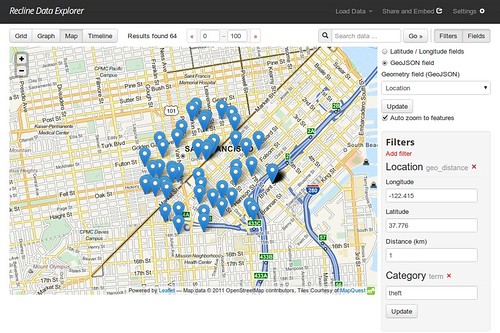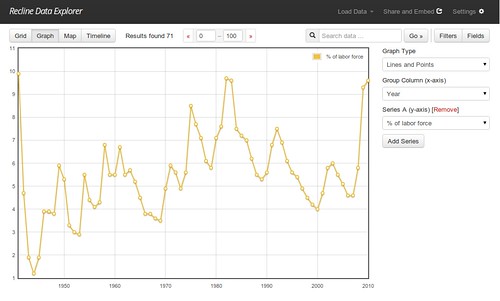Today we’re pleased to announce the first public release of Recline.JS, a simple but powerful open-source library for building data applications in pure Javascript.
For those of you who want to get hands on right away, you can:
- Try out a demo – like this demo of the grid, graph and map components
- Dive in and build an app using the library following the Tutorial
- Read the full documentation
- Check out the Recline.JS code on Github
What Is It?
Recline is a Javascript library of data components incuding grid, graphing and data connectors.
The aim of Recline is to weave together existing open-source components to create an easy to use but powerful platform for building your own data apps.
The views can be embedded in to other apps just like we’ve done for CKAN and the DataHub where it’s used for our data viewer and visualisations.
What makes Recline so versatile is its modularity, meaning you only need to take what you need for the data app you want to build.
Main features:
- View (and edit) your data in a clean grid / table interface
- Built in visualizations including graphs, maps and timelines
- Load data from multiple sources including online CSV and Excel, local CSV, Google Docs, ElasticSearch and the DataHub
- Bulk update/clean your data using an easy scripting UI
- Easily extensible with new Backends so you can connect to your database or storage layer
- Open-source, pure javascript and designed for integration — so it is easy to embed in other sites and applications
- Built on the simple but powerful Backbone giving a clean and robust design which is easy to extend
- Properly designed model with clean separation of data and presentation
- Componentized design means you use only what you need
Who’s Behind It?
Recline has been developed by Rufus Pollock and Max Ogden with substantial contributions from the CKAN team including Adria Mercader and Aron Carroll.
Demos
There are a selection of demos now available on the Recline website for you to try out.
Multiview Demo
The Data Explorer
Timeliner
Rufus Pollock is Founder and President of Open Knowledge.














3 thoughts on “Announcing Recline.JS: a Javascript library for building data applications in the browser”
Comments are closed.